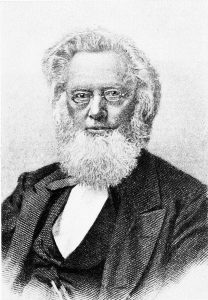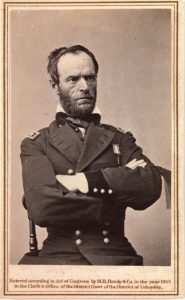
Frederick Augustus Porter Barnard, third headmaster of the University of Mississippi but the first one to be titled chancellor, helped the university survive one of the South’s most devastating attacks: Gen. William Sherman’s March to the Sea during the Civil War.
While teaching at Louisiana Seminary, Barnard made a friend whose name may sound familiar – William Tecumseh Sherman – who would later become a general in the Union Army known for burning his way across the South..
Junior history major Samantha Case, an ambassador for the UM Department of History, is familiar with the story of collaboration between Sherman and Barnard.
“I think the friendship they formed there (in seminary) did help the university. Just because both universities are in the South,” Case said. “I also think that when Sherman walked through the university, he saw Barnard Observatory and connected it to his old friend.”
“The Ole Miss Experience,” a book edited by Natasha Jeter that is frequently used as an educational tool in freshman and transfer experience classes, quotes Sherman while troops under his command were making their way through the South and stopped at the university.
“When I rode through the grounds of the college, I thought of you (Barnard) … and … thought I saw traces of your life, of which I remember you spoke,” Sherman said.
Following this reflection, Sherman gave an order to the Union soldiers led by Gen. A.J. “Whiskey” Smith to spare the university’s campus because of his friendship with Barnard.
“One of the buildings that was spared was the new observatory, which was to house, at the time, the world’s largest telescope. Today it is Barnard Observatory,” the catalogue said.

According to the book “Historical Catalogue of the University of Mississippi 1849-1909,” which was compiled by UM, the university would also be saved by the soldiers occupying it.
“During the Civil War, the buildings of the university were occupied sometimes by Confederate and sometimes by federal soldiery,” the catalogue said.
The catalog describes how federal soldiers in particular spared the university. The text reveals that Gen. Sherman was not the only leader for the Union vying for the university’s safety. Gen. Ulysses S. Grant also formed a friendship with Barnard, and that relationship, too, helped secure the university’s safety.
“When the university’s buildings were occupied by federal soldiery the personal influence of the late Professors Barnard, Boynton and others who were in the North secured the interest of Gen. Grant in the protection of the apparatus and buildings belonging to the institution,” the catalogue said.
Having the two most powerful men from the North taking an interest in the well being of UM and helping to preserve the campus is the largest reason the campus was spared from destruction during the Civil War.
Gen. Sherman’s goal during his march was to obliterate the South’s way to support itself by burning all of the fields and buildings.
“The Ole Miss Experience” book corroborates what Case said. While most of the city of Oxford was burned, much of the university was spared.


























